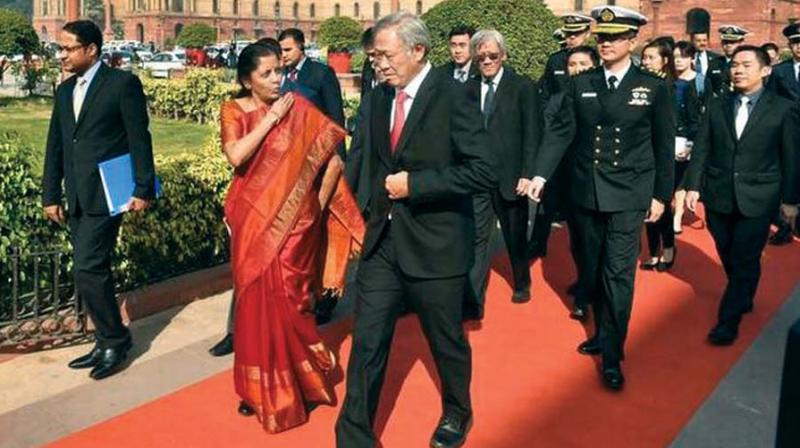By Invitation: Politics of patriarchy Women aren't just a statistic, you know!
There is a need for legislative and constitutional reforms to ensure women's fair access to political spheres.

The political system is, in essence, an enabler of democracy. In an ideal world, of course. In India, the system is highly paradoxical in nature: As a system, it is fluid enough to absorb new ideologies and alliances. At the same time, it is rigid enough to withstand continuous male domination. Today, as more women in the country assert their rights, are educated and working in various fields - to what is this tantamount without political change?
'Political power key to social progress'
In order to achieve social progress, the empowerment of women in the political system is binding. As Dr B.R Ambedkar said, "political power is the key to all social progress," it obligates women participation not only at political leadership level but also at integration of women in all political spheres. Gender balance in political participation and decision-making is the internationally agreed target set in the Beijing Declaration. In fact, UN Women Report (2013) on Women's Leadership and Political Participation found that women demonstrate political leadership by working across party lines through parliamentary women's caucuses - even in the most politically combative environments.
Nevertheless, statistics indicate alarming conditions of women participation in mainstream Indian politics. The current Lok Sabha has 66 women MPs compared to the First Lok Sabha, which had 22. This implies that seven decades of democracy in independent India has achieved a mere threefold increase in the number of women MPs. The average share of women parliamentarians differs from region to region. As of June 2017, these were (single, lower and upper houses combined): Nordic countries, 41.7 per cent; Americas, 28.1 per cent; Europe including Nordic countries, 26.5 per cent; Europe excluding Nordic countries, 25.3 per cent; sub-Saharan Africa, 23.6 per cent; Asia, 19.4 per cent; Arab States, 17.4 per cent; and the Pacific, 17.4 per cent. Globally, there are 38 States in which women account for less than 10 per cent of parliamentarians in single or lower houses, as of June 2016. Only two countries have 50 per cent or more women in parliament in single or lower houses: Rwanda with 61.3 per cent and Bolivia with 53.1 per cent.
‘States’ of prejudice
The average representation of women MPs (12.15%) is higher than the national average of women MLAs in state assemblies, which stands at a dismal 9%. There exists a prejudice that few women are willing to or have taken the political plunge, number of women contestants tells an interesting story. But the data disproves the same patriarchic perception. Between 1957 (the earliest data available) and 2015, the total number of women contestants has increased from 45 to 668. That is a whopping 15 fold increase in the number of women contesting. In fact it is other way around. That means if we look at male contestants during the same span, the number has increased from 1474 to 7583 meaning the rise has been five-fold. This indicates the level of willingness amongst women to be part of political leadership.
Higher success rate
Women representatives have had a greater success rate in terms of being re-elected than men, as per election trends. In 1971, the success rate for men representatives was 18%, whereas it was 34% for women. The 16th Lok Sabha election results appear to reach the same outcome: the success rate was 6.4% for women and 9.3% for women. States have different experiences in terms of electing women representatives at state assemblies. For example, of the 225 seats in the 14th Karnataka Legislative Assembly, there are six elected women and one nominated. That is less than three percent of the total strength.
Why is the degree of representation still so low? It is argued that parties only nominate women to seats where their chances are low anywhere, being risk-averse and not seeing their female counterparts as capable of carrying the party to victory. This indicates that women still have only de jure rather than de facto access in exercising their political rights. There were a total of 175 female candidates of the 2945 candidates. The Congress gave tickets to 8; the BJP had 7 contestants and JD(S) scored high among the parties with 12 candidates in the fray. 67 of these women were independents. Why is there such a dismal record with the political parties, as far as giving tickets to women is concerned? In fact reservation came is a reparation in empowering the women in political participation and decision making. Thus, 73rd and 74th constitutional amendments enacted to ensure 33 per cent of the seats in local governments for women.
Misuse of reservations:
The implementation of reservation for women was misused in male- dominated families. Several reports by the Ministry of Panchayati Raj found that in most cases, husbands control the elected women representatives irrespective of the three tiers. There is another view that greater participation in terms of women leadership at the apex level in the political parties and the administrative positions would be a pre-condition for their economic and social emancipation.
Reforms
Ironically, though women in India have held the highest positions including those of President, Prime Minister as well as Chief Ministers of various states in India, the country ranks 20th from the bottom in terms of representation of women in Parliament, as per the World Economic Forum's Global Gender Gap Report 2012. Also, the Women's Reservation Bill (108th amendment) was not passed in Parliament during the period when Pratibha Patil was President of India and Sonia Gandhi, Chairperson of the UPA. This indicates that mere political leadership at top levels will not enhance the woman's emancipation in the mainstream politics but There is a need for legislative and constitutional reforms to ensure women's fair access to political spheres as voters, candidates, elected officials and civil service members.
(As told to Ralph Alex Arakal)

